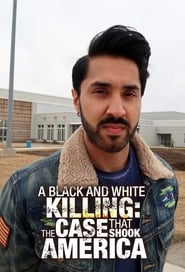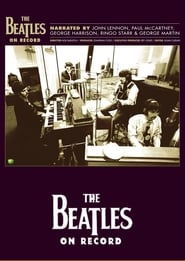Bbc Two TV Series - Page 94
-
The Food Chain
1996
The Food Chain
1996
Jancis Robinson continues her series exploring the relationship between ourselves and what we eat. Spoilt for Choice? This programme investigates how the supermarkets balance the running of lucrative businesses with providingthe nation with good quality, healthy food. Do shoppers take enough responsibility for what they eat - or have they relinquished it to the food retailers? -
A Black And White Killing: The Case That Shook America
2019
Journalist Mobeen Azhar uncovers the truth behind the killing of a black man by a white supremacist gang member. Did Larnell Bruce die because he was black? -
Show Me the Monet
0000
Show Me the Monet
0000
Show Me the Monet is a British television series first aired on BBC2 in May 2011. It is presented by Chris Hollins. The programme has been described as the "artworld's version of The X Factor and Dragons's Den". -
Michel Roux's Service
2011
Michel Roux sets out on a personal mission to train eight young people as front-of-house superstars. -
The British at Work
2011
-
The Beatles on Record
2010
In 1962 an unknown group from Liverpool entered Abbey Road Studios to record their debut single. During the next eight years they created what is arguably regarded as the greatest collection of studio recordings of the 20th century. This film charts The Beatles' extraordinary journey from Please Please Me to Abbey Road and reflects how they developed as musicians, matured as songwriters and created a body of work that sounds as fresh now as the time it was recorded. Narrated entirely by John, Paul, George and Ringo and Sir George Martin, the documentary features rare footage and photos from The Beatles' archives and never heard before out-takes of music and studio chat from the Abbey Road recording sessions. -
Muslim Driving School
2010
Muslim Driving School is a documentary series which follows some Muslim women as they learn how to drive. -
I'm in a Rock 'n' Roll Band!
0000
I'm in a Rock 'n' Roll Band! is a documentary television series broadcast on BBC Two, narrated by Mark Radcliffe and first broadcast on 1 May 2010. The series charts the history of rock music, with the first five episodes focusing on different members of a typical band, such as the singer or the guitarist. The final episode is special live episode, featuring "industry experts discuss their favourite musicians before creating the ultimate fantasy band." This will also feature the result of a public vote, which will ask viewers who their think are the greatest rock bands and band members. At the end of the series, Led Zeppelin were named the best ever band, while the make-up of the Ultimate Fantasy Band was announced as Freddie Mercury, Jimi Hendrix, John Bonham and Flea. -
Ben's Zoo
2007
Ben's Zoo
2007
Series following a writer's attempts to reinvigorate the Dartmoor Wildlife Park in Devon. -
What to Eat Now
2008
What to Eat Now
2008
What to Eat Now is a six-part series, broadcast on BBC Two and presented by chef Valentine Warner. The basic message behind the series is that people should eat food that is in season. The series has covered autumnal foods, both meats such as rabbit and pigeon, and fruits and vegetables and fungi, including apples, pears, pumpkins, chicory, beetroot and truffle as part of the series. The programme was first broadcast on 15 September 2008. In looking at apples, the show visited Benedictine monks, and talked about how they could find the best apples to make a dish called "apple charlotte". In looking at beetroot, the show visited a farmer who practiced biodynamic farming, believing that the phases of the moon could affect plant growth. The show travelled to Lindisfarne to illustrate mussel catching. Warner has also published two books entitled "What to Eat Now" and "What to Eat Now - More Please!" to accompany the series'. A second series was broadcast in 2009. -
The Wright Taste
0000
The Wright Taste
0000
The Wright Taste is a five-part BBC Wales documentary series that started in late October 2008. It follows food critic and restaurateur Simon Wright's journey farming animals from field to fork. Simon is a partner in the restaurant Y Polyn in South West Wales. Y Polyn also features on cookery show The Hairy Bikers' Food Tour of Britain. -
Hyperland
0000
Hyperland
0000
Hyperland is a 50-minute long documentary film about hypertext and surrounding technologies. It was written by Douglas Adams and produced and directed by Max Whitby for BBC Two in 1990. It stars Douglas Adams as a computer user and Tom Baker, with whom Adams had already worked on Doctor Who, as a personification of a software agent. In hindsight, what Hyperland describes and predicts is an approximation of today's World Wide Web. -
Sweet Baby James
2007
Sweet Baby James
2007
Celebrity chef James Martin shares his love of puddings with the nation, giving viewers the most comprehensive guide yet to desserts, puddings and cakes -
Bill Oddie Goes Wild
0000
Bill Oddie Goes Wild
0000
Bill Oddie Goes Wild was a British TV programme, about natural history, presented by Bill Oddie. Three series were made. -
No Stilettos
0000
No Stilettos
0000
No Stilettos was a short-lived BBC music series made by BBC Scotland in Glasgow, and presented by Scottish pop and folk musician Eddi Reader. The programme was broadcast in 1993 on BBC2 in the UK and featured a mix of musical guests with an emphasis on the alternative/independent music scene of the time. The programme was recorded in the Cottier Theatre, a converted church in Glasgow's west-end, and artists who featured included 'local' Scottish bands such as Teenage Fanclub and the BMX Bandits, to those from further afield such as Evan Dando of the Lemonheads and Pulp. -
Sesame Tree
0000
Sesame Tree
0000
Sesame Tree, is a version of Sesame Street made entirely in Northern Ireland, is a children's television series produced by Belfast-based production company Sixteen South and Sesame Workshop. The first episode aired on BBC Two in Northern Ireland on 5 April 2008 with the first series subsequently airing nationwide on CBeebies in August 2008. A second series was launched in November 2010 and broadcast on CBeebies from 22 November 2010. -
The O-Zone
0000
The O-Zone
0000
The O-Zone was a weekly music magazine show broadcast on BBC from 1989–2000. The First series was presented by Andy Crane on BBC One as a 10 min filler each weekday morning during the summer school holidays before switching to Sunday morning slot from September on wards. The series continued as a 5 to 15min filler shown during school holidays and Sunday mornings on CBBC throughout the year by CBBC presenters Andi Peters, Philippa Forrester, Toby Anstis and Zoë Ball by 1992. The show was given an overhaul and makeover from 13 January 1995, with Jayne Middlemiss and Jamie Theakston as the new dual presenters. The series was moved to Friday evening with Sunday repeat. The series was extended to 20mims from September 1996. There was also a spin-off series, The Pop Zone shown in 1998. In October 2000, the show was replaced by Top of the Pops Plus, which had already been on UK Play. That programme was axed in 2001. -
The Family That Walks On All Fours
0000
The Family That Walks On All Fours is a BBC2 documentary that explored the science and the story of five individuals in the Ulas family in Turkey that walk with a previously unreported quadruped gait. The documentary was created by Passionate Productions and was broadcast on Friday 17 March 2006. The voiceover is Jemima Harrison. A revised version of the documentary that shifts the focus away from the story of the discovery of the family and includes the views of additional scientists was shown on NOVA on 14 November 2006. Debate exists as to the nature and cause of their walking, including controversial speculation in the form of the Uner Tan syndrome that it may be a genetic throwback to pre-bipedal hominid locomotion. Nicholas Humphrey, who accompanied the documentary makers, concluded that it was due to a rare set of genetic and developmental circumstances coming together. First, their mother recalls that initially all of her 19 children started off walking with a bear-crawl. Second, due to an inherited recess -
Marvels of the Modern Age
2006
Dan Cruickshank's Marvels of the Modern Age is a BBC documentary series in which Dan Cruickshank traces the roots of Modernism and focuses on the movement's leading lights, such as Le Corbusier and Frank Lloyd Wright, and the century's most seismic political events including the rise of Nazi Germany. The series was first broadcast on BBC Two in 2006 to coincides with the exhibition Modernism: Designing a New World at the Victoria and Albert Museum in London.



